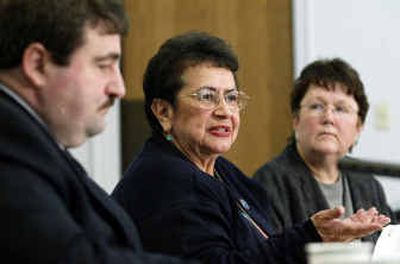The big six

Road construction/bonding
Gov. Dirk Kempthorne wants $1.6 billion in road construction around the state, including major upgrades for U.S. Highway 95, financed by bonds issued against future federal highway allocations.
Where things stand: The governor’s proposal, SB 1183, passed the Senate overwhelmingly, but it has languished in the House Transportation Committee, which voted 9-5 on Wednesday against moving the bill forward, at least for now. Kempthorne reacted angrily, vetoing eight unrelated House bills and threatening that all House bills would be “veto fodder” until the House passes his highway bill.
Water
Idaho faces two huge water issues this legislative session: Approval of a water rights agreement settling claims by the Nez Perce Tribe to virtually all the water in the Snake River; and an effort to avoid a shutoff of thousands of water rights in Southern Idaho.
Where things stand: Kempthorne signed into law three bills ratifying the historic Nez Perce water rights agreement. Two days before the March 31 deadline, the Nez Perce Tribal Executive Committee also ratified the deal, the last step needed for it to take effect. On the Eastern Snake Plain issue, three complicated bills dealing with groundwater districts, fees, assessments and bonds and a funding bill that includes both a multimillion-dollar settlement and funding for North Idaho water projects have passed the House.
Budget and taxes
Idaho is required to have a balanced budget, and its sales tax is scheduled to drop from 6 percent to 5 percent July 1, trimming close to $180 million a year from the state’s tax revenues.
Where things stand: Legislative budget writers have set a $2.18 billion budget for the state for next year, slightly below Kempthorne’s $2.22 billion recommendation. Both houses have passed significant tax breaks for businesses, including the governor’s corporate headquarters tax incentive package, a scaled-down version of those incentives for small employers who add as few as 10 new jobs, and a $7 million sales tax exemption requested by Micron Technology Corp. A $3.2 million alternate energy generation equipment sales tax exemption is awaiting final passage in the House.
Education
Education is the top issue in Idaho in virtually every poll. It’s also the single largest slice of the state’s general fund budget.
Where things stand: A proposal from Rep. Scott Bedke, R-Oakley, to roll back a state program designed to subsidize school construction interest costs while also returning lottery funds to schools passed the House with just three “no” votes but was killed in a Senate committee. Legislation allowing tuition to be charged at most of the state’s four-year universities, rather than just fees, was signed into law.
Secrecy
Both the Idaho Constitution and Idaho Open Meeting Law require open legislative meetings, but lawmakers have held several closed-door committee meetings in recent years and majority Republicans hold closed-door caucuses.
Where things stand: The Idaho Press Club has filed an appeal to the Idaho Supreme Court in its lawsuit over closed meetings of legislative committees. A 4th District judge earlier ruled against the club’s claim that the Idaho Constitution requires the committee meetings to be open to the public, ruling instead that only the formal floor sessions in each house of the Legislature are constitutionally required to be open. Majority caucuses in both houses continue to hold closed meetings, while the minority caucuses in both houses hold open meetings.
Medicaid
The federal-state program that provides health coverage for disabled and poor Idahoans has been growing fast.
Where things stand: After months of study and long hearings, lawmakers set a budget for Medicaid that adds $10 million above the governor’s recommendation to cover expected increases in caseloads. That brings next year’s Medicaid budget to $331.3 million in state general tax funds, a 15 percent increase, and $1.2 billion overall, including the federal funds that match the state dollars.